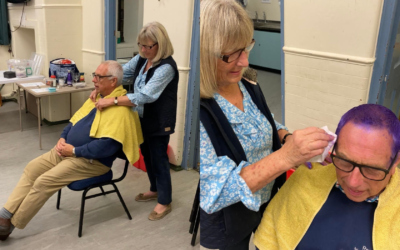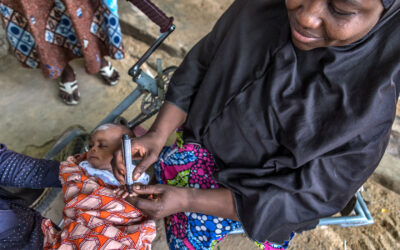Nine years ago, Konnie Huq, flew to India to be part of Rotary International’s polio immunisation campaign.
She headed for Uttar Pradesh in northern India which, at the time, had a population of more than 190 million and was described as having the world’s highest concentration of polio infection.
Konnie wrote then: “This is one of the final frontiers where the war against polio is being fought.”
She saw at first-hand the squalor which people were living in, the misconceptions which were swirling around the tight-knit community about the polio immunisation programme, and the battles which the Rotary volunteers, working along their Indian health colleagues, had to fight on a daily basis.
It is an assault on your senses. It is one of those memories which stays with you. People living and eating among rubbish – those two things should not mix.”
These are memories, nine years on, which she will never forget.
“The memory of going to the rubbish tip cum housing estate will always stick with me,” recalled Konnie.
“As it is, when you go to somewhere like India where the population is absolutely massive and the cities are totally crowded, the whole experience is overwhelming the moment you step off the plane.
“The colours, the sights, the sounds.
“But when you go to somewhere like the rubbish tip, every sense is hit.
“The smell of faeces is the air and the air is close.
“There is the noise with mothers and father going about their ordinary day life, mixed with people combing through the rubbish to find things to re-sell.
“You walk past people’s houses and kitchens and see dumped packaging, bottles and old clothes which they are trying to sell.
“It is an assault on your senses.
“It is one of those memories which stays with you. People living and eating among rubbish – those two things should not mix.”
Konnie saw the immunisation programme being delivered.
Every ‘Purple pinkie day’, the teams would go out into the streets to encourage all young children to get immunised.
Schools organised campaigns and marches.
“It was a real struggle,” added Konnie.
“There are lots of remote places in India, and lots of villages, and you can’t leave one child not immunised because
polio can come back so quickly.”
Fast forward to 2018, with India declared polio-free in 2014, and Konnie insists that if India can do it, there is no reason why the whole world cannot wipe out this crippling disease.
The Rotary End Polio Now campaign is massively important because people feel that when the polio numbers are as low as they are now, this is a done deal.”
“It can be done and it will be done in our lifetime so long as we don’t rest on the job,” warned Konnie, who is a Rotary polio ambassador.
“That is why the Rotary End Polio Now campaign is massively important because people feel that when the polio numbers are as low as they are now, this is a done deal.
“But as we have seen in China with the resurgence of polio after they thought they were polio-free – another country with a massive population – you can never, never rest on your laurels.”
Since 1985, Rotary has contributed nearly $1.2 billion (£911 million) and countless volunteer hours to the protection of more than two billion children in 122 countries.
The disease remains endemic in three countries; Afghanistan, Nigeria, and Pakistan, although other countries remain at risk for imported cases.
Konnie believes that polio will be cracked within the next decade.
She explained: “A country needs to be three years free for it to be declared polio-free. So that is an achievable goal if we can pull together and make it happen.”
In 2009, she wrote an article for the BBC.










